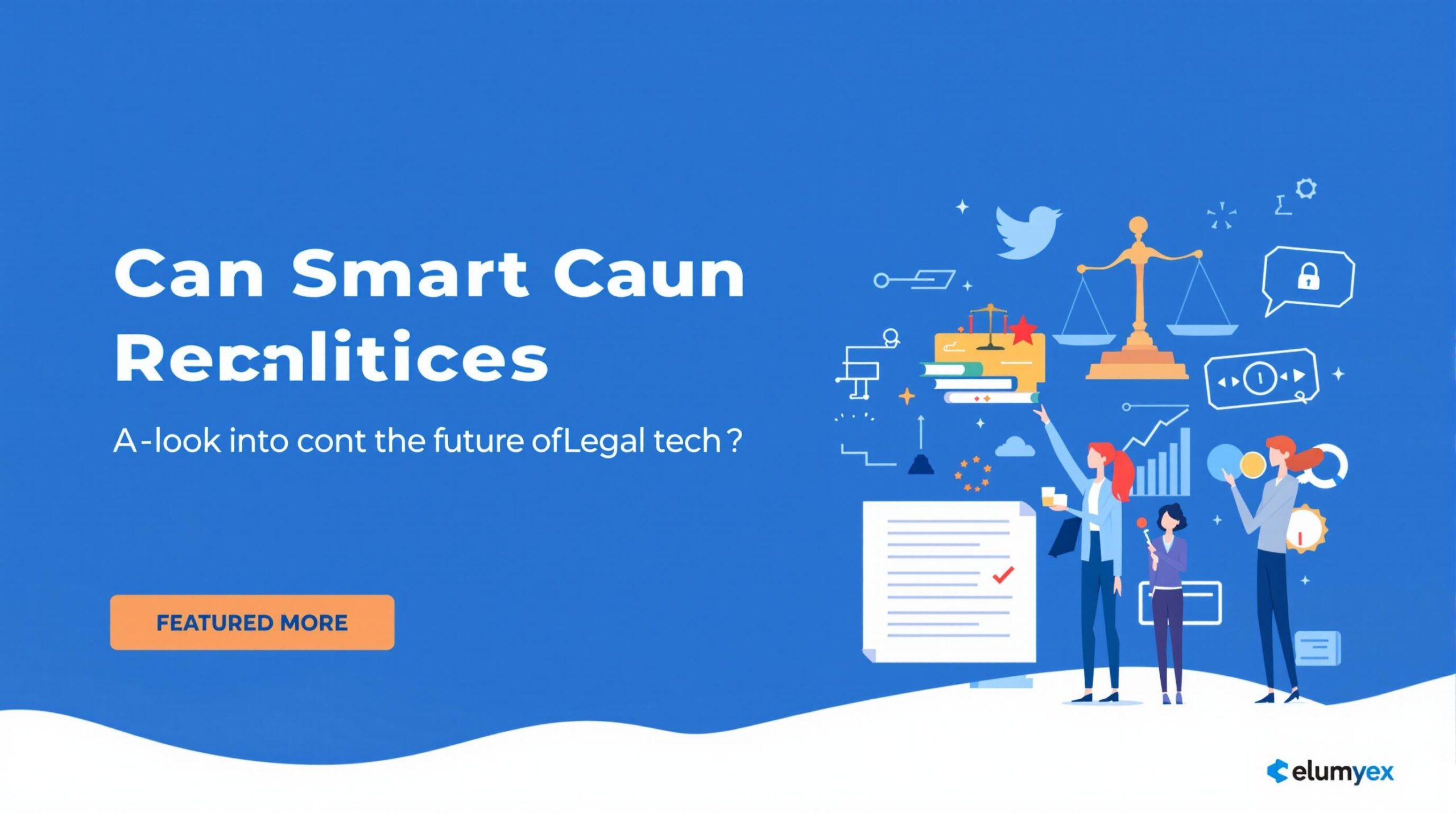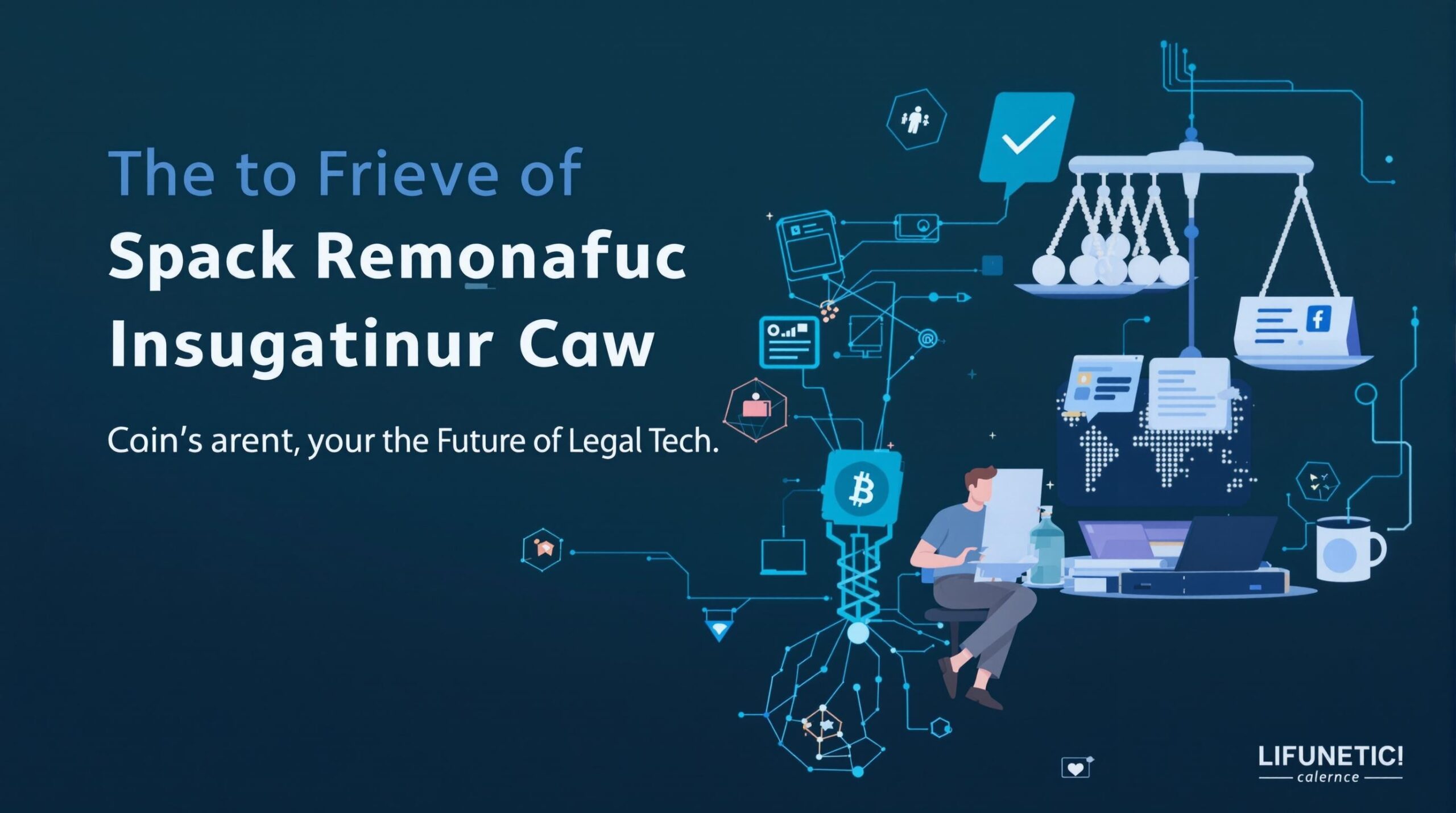Understanding Smart Contracts
Smart contracts are creating a buzz in the legal and tech worlds. But what exactly are they, and can they truly replace human lawyers? Let’s dive into the fascinating landscape of smart contracts to uncover their potential and limitations.
What is a smart contract? A smart contract is a self-executing contract with the terms of the agreement directly written into lines of code.
The Mechanics of Smart Contracts
Imagine a vending machine. You insert a coin and select a snack. If the process goes smoothly, the machine delivers the snack, meeting your contractual expectation. Smart contracts operate in a similar manner, executing predefined actions when specific conditions are met. They operate on blockchain technology, ensuring that transactions are secure and immutable.
Key Features of Smart Contracts:
- Automation: Executes terms automatically when conditions are met.
- Security: Utilizes cryptographic protocols on the blockchain for safety.
- Transparency: Recorded on a public ledger, preventing manipulation or alteration.
- Trustless: Requires minimal trust from the parties involved, as the code enforces the terms.
Smart contracts are secure and automated agreements, offering unprecedented efficiency and transparency in transactions.
How Do Smart Contracts Work?
At their core, smart contracts are programmed agreements that automatically execute when predetermined conditions are met. Here’s a step-by-step look at how they function:
- Drafting the Code: Developers write the smart contract using a programming language suited for blockchain, such as Solidity.
- Deployment on the Blockchain: The smart contract is deployed on a blockchain platform like Ethereum, where it resides permanently.
- Introduction of Conditions: The contract awaits the satisfaction of its predetermined conditions, which could be various real-world events or data points.
- Execution: Once conditions are met, the contract self-executes, completing the transaction without human intervention.
Smart Contracts vs. Traditional Contracts
Can smart contracts completely replace traditional paper contracts and the lawyers that draft them? Not quite yet. While they excel at automating simple transactions and ensuring transparent enforcement, they also face limitations. For instance, complex negotiations often require the adaptability and foresight of a seasoned lawyer.
The use of subjective terms such as “reasonable efforts” or the need for amendments further highlights where traditional contracts currently have the upper hand. Human lawyers can interpret nuances, make judgment calls, and adapt agreements as needed—skills that smart contracts, as rigid lines of code, currently struggle with.
Despite their efficiency, smart contracts lack the flexibility to handle subjective interpretations or negotiate complex terms.
While smart contracts hold significant promise, merging these digital agreements with traditional legal frameworks can unlock their true potential. This digital-legal hybrid approach ensures robust, enforceable, and adaptable agreements, benefiting from both the precision of code and the wisdom of seasoned legal professionals.
“Smart contracts offer efficiency and security but lack the human element needed for complex legal negotiations.” – Legal Tech Analyst
Understanding Smart Contracts and Their Implications on the Legal Profession
“Smart contracts are not just technological innovation; they represent a potential transformation in how legal agreements are made and enforced.”
What Exactly Is a Smart Contract?
Smart contracts are digital protocols that facilitate, verify, and enforce the terms of a contract automatically through blockchain technology. These contracts not only represent a legally binding agreement but also have the potential to reshuffle the conventional ways of transaction processing.
- Key Concept: At its core, a smart contract is a set of coded instructions that automatically execute once predetermined conditions are met.
- Key Concept: Distributed ledger technology, central to blockchains, ensures that transactions are transparent, secure, and immutable.
How Do Smart Contracts Operate?
Smart contracts operate on blockchain platforms like Ethereum, which support a virtual machine capable of executing complex computational algorithms. These platforms enable the conversion of traditional legal agreements into self-executing, autonomous code that requires no third-party intervention.
Ethereum’s capability as a programmable blockchain empowers it to function as a ‘World Computer’ supporting decentralized applications.
Smart Contracts Vs. Traditional Contracts
In contrast to traditional paper-based contracts, smart contracts promise increased security, reduced costs, and speedier enforcement by eliminating the need for manual oversight or intermediaries such as brokers or escrow agents. But do they entirely eliminate the need for lawyers?
- Implementing Protocols: Smart contracts execute and enforce themselves through code, relying on blockchain verification for authenticity.
- Trustless System: These contracts operate in a decentralized environment, negating the need for trust between parties.
Limitations of Smart Contracts
Despite their advantages, smart contracts have limitations, primarily due to their binary logic which struggles with subjective interpretations inherent in many legal agreements. The complexity of legal language and the nuances of contractual obligations often require expertise that a purely automated system cannot provide.
Smart contracts can falter in scenarios that demand subjective judgment or contextual decision-making, areas where human lawyers excel.
Future Prospects – Will Smart Contracts Replace Lawyers?
While smart contracts offer exciting prospects for transactional efficiency, they aren’t expected to entirely replace traditional legal roles. Lawyers bring indispensable insights and nuanced understanding of legal contexts that are critical for complex deals. Human legal advisors remain essential, particularly in non-standardized, high-stakes transactions.
The Evolving Role of Legal Professionals
The legal profession isn’t static, and as technology advances, the roles of lawyers will naturally evolve. Those specializing in technology will find opportunities to integrate these innovations into their practices, serving as mediators between complex tech and intricate legal frameworks. This evolution promises to cultivate a new breed of tech-savvy legal professionals adept in both law and coding.
- Legal Expertise: The core roles of negotiation, litigation, and contract writing remain essential.
- Technology Integration: Lawyers are now required to have an understanding of technological innovations and their applications within the legal framework.
The intersection of smart contracts and traditional legal practice allows for innovative solutions that blend technology with human intuition.
The Importance of Collaborative Efforts
To fully unlock the potential of smart contracts in reshaping legal services, collaboration between tech innovators and legal professionals is crucial. By integrating legal acumen with technological prowess, the future of law could be enhanced for better efficiency and accessibility.
Conclusion: A Harmonized Future
While the rise of smart contracts marks a significant evolution in the way agreements are handled, it is not a herald of the end of legal professionals. In fact, it enriches the field, creating an integrated landscape where technology complements legal expertise to offer unprecedented efficiency and accuracy in transactions. The future of law is not diminished by smart contracts; rather, it is refined.
This HTML content is structured to integrate directly with WordPress for enhancing SEO and user engagement. It balances technical insights with accessible comprehension to appeal to both tech enthusiasts and potential clients considering legal counsel.

Understanding Smart Contracts in the Blockchain Era
With the buzz surrounding blockchain technology and smart contracts, you might wonder how these innovations are reshaping the legal landscape. Let’s dive deep into what smart contracts are and whether they’ll replace lawyers in the future.
“Can smart contracts replace lawyers? The answer is not as straightforward as one might think.” – Brett Cenkus
What Exactly Are Smart Contracts?
Smart contracts are essentially computer protocols that facilitate, verify, or enforce a negotiation or performance of a contract transaction. They are coded on the blockchain, a decentralized and secure ledger, ensuring each transaction is tamper-proof and transparent. From a legal standpoint, they function as automated, self-executing contracts.
- Key Concept: Like a vending machine, smart contracts automatically execute and enforce terms upon the fulfillment of certain conditions.
- Example: A rental agreement smart contract could automatically transfer the property’s ownership once payment is confirmed through the blockchain.
The Role of Ethereum and Blockchain
Introduced by Vitalik Buterin, Ethereum stands out by supporting smart contracts along its blockchain network. Unlike Bitcoin, which serves primarily as a cryptocurrency, Ethereum’s Turing complete environment allows for complex, programmable contracts usable in varied applications beyond financial transactions.
Ethereum’s programmability sets it apart as the “World Computer” capable of altering societal and business paradigms through smart contracts.
Pros and Cons of Smart Contracts
| Advantages | Disadvantages |
|---|---|
| Automation reduces the need for intermediaries and accelerates transactions. | Requires accurat coding; errors can lead to unintended outcomes. |
| Transparency due to immutable blockchain records. | Legal nuances and subjective terms are hard-coded, lacking human judgment. |
Why Lawyers Remain Indispensable
You might argue that because smart contracts are “smart,” we no longer need human lawyers. However, there are a few reasons why that’s not quite the case:
- Complexity and Nuance: Many legal agreements involve nuances and complex negotiations that can’t easily be distilled into code.
- Interpretation and Context: Lawyers provide insight into contract terms and real-world applications that code cannot predict or interpret.
Blending Technology with Traditional Lawyering
While smart contracts offer remarkable efficiencies, they work best when augmented by traditional legal knowledge. This synergy ensures legal principles are not lost in translation into blockchain code.
Smart contracts complement traditional contracts, but the expertise of skilled lawyers remains crucial for nuanced legal interpretations.
The Future of Smart Contracts in the Legal Profession
Legal professionals must adapt and familiarize themselves with blockchain technology to better serve tech-savvy clients. This adaptation won’t eliminate lawyers but rather redefine their roles to include overseeing and advising on the development and deployment of smart contracts.
Conclusion: Navigating the New Legal Frontier
As businesses ponder using smart contracts, it’s essential to understand their intricacies and how they integrate with current legal practices. Our experienced team is ready to guide you through this evolving landscape, ensuring your legal needs align with cutting-edge technological solutions.
Executing any legal strategy requires precision, logic, and a touch of human insight—qualities that no code can emulate entirely.
Understanding Blockchain: A Revolutionary Technology
To grasp the impact of smart contracts, we first need to understand blockchain technology. You might have heard it compared to the internet—both are game-changers in how we interact and operate. However, while the internet is all about exchanging information, blockchain is about verifying it—think of it as the ultimate notary for transactions.
“Your Voice, Our Mission” – we champion your rights with the tenacity and dedication that has earned us the trust of our community members.
The Nuts and Bolts of Blockchain
- Decentralized Ledger: At its core, blockchain is a public ledger spread across numerous computers.
- Security Through Cryptography: It uses cryptography to ensure data can’t be altered without detection.
- Distributed Consensus: Ensures trust without intermediaries by requiring network-wide agreement before transactions are recorded.
What Are Smart Contracts?
Smart contracts are computer protocols that facilitate, verify, or enforce the negotiation or performance of a contract using blockchain technology. Simply put, they are self-executing contracts with the terms of the agreement directly written into code.
How Do Smart Contracts Work?
Imagine a vending machine for legal agreements. You insert a coin (cryptocurrency) to purchase a soda (contract fulfillment), and the machine automatically dispenses it. No cashier needed. That’s the beauty of smart contracts—automation and assurance.
The Role of Ethereum
Ethereum stands out as the platform where most smart contracts are executed due to its unique feature called the Ethereum Virtual Machine (EVM), which is Turing complete. This means it can execute complex computations, making it a robust platform for decentralized applications.
Smart Contracts vs. Traditional Contracts
| Aspect | Smart Contracts | Traditional Contracts |
|---|---|---|
| Execution | Automatic upon condition fulfillment | Requires manual intervention |
| Intermediaries | None needed, trustless system | Usually requires lawyers/agents |
| Cost | Usually lower, but dependent on network usage | Higher due to fees and human labor |
| Alteration | Challenging due to immutability | Relatively easier with amendments |
“Smart contracts are self-executing with the terms of the agreement written into lines of code. They promise unparalleled efficiency and reliability, but will they replace traditional legal systems?”
The Evolution and Limitations of Smart Contracts
Smart contracts are undoubtedly exciting, but they face some limitations:
- Complexity: They can’t handle complex legal concepts easily—like “reasonable efforts”
- Alterations: Difficult to amend once executed
- External Data Dependence: Still require oracles for real-world data integration
Why Lawyers Aren’t Going Out of Style
Legal expertise involves anticipating legal hurdles and understanding nuanced human elements in contracts. Smart contracts might automate performance, but they can’t replace the foresight that experienced contract lawyers provide.
“Smart contracts are a powerful tool but not a panacea. As technology evolves, so will the role of legal professionals.”
The Future: A Symbiosis of Tech and Law
Innovation is the name of the game. Just as brick-and-mortar stores adapted to e-commerce, lawyers will adapt to blockchain. It means collaborating more with developers and sometimes dealing with code as much as codes of law.
As businesses harness the benefits of blockchain, they’ll need legal expertise to navigate this brave new world. Whether it’s understanding the enforceability of smart contracts or leveraging them for specific industries, your trusted legal advisor should be ready for the journey—and we are.
Engage with Experts
Ready to dive into blockchain and smart contracts, but not sure where to start? Our firm is here to guide you through the complexities with ease and expertise. Contact us today to see how we can simplify the future for you.
This content, designed for SEO optimization, aims to inform readers about smart contracts and blockchain technology succinctly, ensuring it is engaging and easily understandable. Using HTML structure, stylistic elements, and strategic positioning of callouts, it’s tailored for direct integration into WordPress, reflecting both technical precision and reader engagement.

How could smart contracts impact the future of legal professions?
Smart contracts may shift certain legal services towards automation, enhancing efficiency and lowering costs. However, they are unlikely to fully replace lawyers who provide essential functions such as interpretation and dispute resolution.
Can smart contracts handle complex legal disputes?
Smart contracts have limited capability in managing complex legal disputes due to their reliance on pre-set conditions without the ability to understand context or negotiate outcomes. Traditional legal systems are still necessary for resolving complexities and unforeseen issues.
What industries are most likely to benefit from smart contracts?
Industries like finance, real estate, and supply chain management are poised to benefit greatly from smart contracts. These sectors can leverage automated efficiencies for clear, structured transactions, reducing the need for intermediaries and accelerating processes.
How do smart contracts interact with artificial intelligence?
Smart contracts and artificial intelligence (AI) can complement each other by combining automation with AI-driven insights. This integration can optimize decision-making processes, although the complexity of full implementation requires ongoing legal and technical collaboration.
The combination of smart contracts with AI could transform the efficiency of legal processes, though it requires careful management of legal, ethical, and technical challenges.

Related Practice Areas
Explore our diverse range of practice areas related to the future of legal tech and smart contracts.
Discover What Our Smart Contracts & Automation Clients Are Saying
At the forefront of our Smart Contracts & Automation practice is a deep-seated commitment to client satisfaction. Each case is handled with utmost care, as echoed in the appreciative feedback from those we represent.

Explore the Future of Legal Tech with Jara
“Your Voice, Our Mission” – we champion your rights with the tenacity and dedication that has earned us the trust of our community members.
Are you ready to embrace the future of legal technology? At Jara, we believe in harnessing the power of smart contracts and automation to revolutionize legal services. Our team is committed to guiding you through the complexities of digital transformation while ensuring your legal rights are protected.
Download the Jara app for Android or iPhone today to experience the future of legal tech.
Contact us: We’re here to answer your questions and help you navigate this new era of legal services. Reach out to us through our website at Jara or email us directly at [email protected].
Forge your path with confidence. Let Jara be your guide in the evolving landscape of legal tech.
“Your Voice, Our Mission” – we champion your rights with the tenacity and dedication that has earned us the trust of our community members.
Understanding Smart Contracts
Smart contracts are self-executing contracts with the terms of the agreement directly written into lines of code. They operate on blockchain technology, ensuring secure and transparent transactions.
How Smart Contracts Work
- Code-Based Agreements: The conditions of the contract are coded in a programming language.
- Blockchain Execution: Once conditions are met, the contract is executed by the network.
- Irreversible Transactions: Transactions are final and cannot be altered once executed.
Smart contracts eliminate the need for intermediaries and can reduce legal costs significantly.
The Legal Aspects of Smart Contracts
While smart contracts offer efficiency, they also present new challenges in legal frameworks. Key issues include:
- Enforceability: Ensure the contract adheres to legal statutes and is enforceable in court.
- Jurisdiction: Determining which legal system applies to disputes arising from the contract.
- Standardization: The lack of standard legal frameworks for smart contracts complicates their application.
Can Smart Contracts Replace Lawyers?
This is a question many ponder. While smart contracts automate many processes traditionally handled by lawyers, they cannot fully replace the nuanced understanding and judgment that human lawyers provide.
Smart contracts are tools that enhance efficiency but still require legal expertise to navigate complexities.
Future of Legal Tech
The integration of smart contracts in legal technology signifies a shift towards digital transformation. Legal professionals will need to adapt, combining technology with their expertise to provide better solutions for clients.
Conclusion
The future will likely see a blend of traditional legal practice with innovative tech solutions. Lawyers will need to embrace these changes, ensuring that while smart contracts evolve, they complement rather than replace human expertise.
Embrace technology to stay ahead in the legal profession while maintaining the irreplaceable human touch.

















